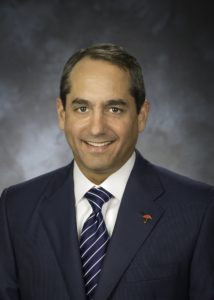During an earnings conference call yesterday, the leader of Travelers insurance alerted listeners to the possibility that frivolous lawsuits by plaintiffs lawyers could slow down the economic recovery from COVID-19 shutdowns.
Alan Schnitzer, whose company reported net income of $600 million, including an $86 million pretax charge associated with the impact of COVID-19, also warned regulators and policymakers to think carefully about expanding workers compensation coverage by creating presumptions of compensability and reported that insurance rate momentum will continue in spite of difficult times for some business insureds. In addition, on the topic of business interruption coverage, he issued another warning, essentially arguing that denting the wherewithal of insurers to pay claims by forcing retroactive coverage is a bad move going into hurricane season.
Schnitzer, who has sounded alarms about litigation trends and social inflation in prior quarters, said, “Our recovery from this crisis will benefit from commonsense tort reform, as well as legal liability protection for healthcare heroes, firms involved in recovery efforts and all businesses seeking to reopen.”

“We should all be concerned that many frivolous lawsuits will be brought and will undermine the nation’s recovery [by] adding expense to R&D related to the development and distribution of COVID-19 tests and therapeutics, delaying employers from responsibly bringing employees back to work and retail businesses from responsibly opening to customers.”
Alan Schnitzer, Travelers
“Those aren’t our insureds, so I don’t have a view on the merits of those cases,” Schnitzer said. “But we should all be concerned that many frivolous lawsuits will be brought and will undermine the nation’s recovery, including by delaying and adding expense to R&D related to the development and distribution of COVID-19 tests and therapeutics, delaying employers from responsibly bringing employees back to work and retail businesses from responsibly opening to customers, and targeting highly vulnerable businesses like those in the healthcare and travel industries which cannot afford the distraction or the expense.”
Schnitzer went on to repeat a statistic that he has shared on past earnings calls from the Institute for Legal Reform, which estimated in 2018 that tort costs amount to more than $3,300 per U.S. household—and more than that in some states. (“Costs and Compensation of the U.S. Tort System,” October 2018)
“The U.S. has the highest tort tax in the world,” he said. “Americans shouldn’t have to endure that, and they can’t afford to at the moment.”
Separately, W. Robert Berkley Jr., CEO of W.R. Berkley, had a similar message during his company’s earnings call last night. “Much of the plaintiffs’ bar with support of litigation funding vehicles that are out there seem to subscribe to the unfortunate idea of never letting a crisis go to waste,” Berkley said. “Some seem to be unencumbered by what the words in a policy say and are very skilled at managing the media,” he said, seeming to focus his remarks on widely reported activities of state and federal lawmakers aimed at retroactively rewriting the language of property policies related to business interruptions.
“While I think it is unlikely that these groups will achieve any success, it is important to recognize that any success that they achieve will ultimately come at a price to society…If loss costs go up, insurance pricing ultimately goes up,” Berkley continued. “Parts of the plaintiffs’ bar and those that fund litigation will win, and the rest of us, as a society, will lose.”
“Ultimately, society is going to have to make a choice [about] whether wordings in policy matter or not and how much is society willing to pay.” (Note: Carrier Management will publish a full report on W.R. Berkley’s earnings later today.)
Specifically addressing the topic of business interruption claims during opening remarks on the Travelers call, Schnitzer said, “For every claim, without exception, we start by looking at the facts of the claim and the terms of the policy to determine whether the claim is covered or not,” adding, however, that Travelers’ commercial property insurance policies that have business interruption “require losses to be caused by direct physical damage to property from a covered cause of loss” and that the company’s “standard policy form specifically excludes loss or damage caused by or resulting from a virus.”
Asked about the level of claims submissions for business income losses, Schnitzer said: “There’s definitely been some claim activity [and] on essentially every one—the vast majority of them—we declined it because we’ve got the exclusion or other provisions that apply.”
During his opening remarks, Schnitzer weighed in on efforts by lawmakers to retroactively expand coverage in spite of exclusions and “direct physical damage” language. “Insurers don’t collect premiums to cover losses that policies weren’t written to cover. Requiring those losses to be covered retroactively on any broad scale would overwhelm the industry’s claims-paying ability for legitimate claims, unfairly leaving many individuals and businesses exposed.”
He continued: “The industry’s financial strength is especially important in a time of increased natural catastrophes. The spring tornado season is already active. Hurricane season is fast approaching, and wildfires represent an ongoing threat,” he said.
Berkley concluded his argument on the same topic by noting that “contract certainty is a core underpinning of the U.S. free market system.”
GDP-Based Businesses
On the Travelers call, executives reported that net premiums rose 4 percent for the quarter to $7.3 billion, with the biggest jumps coming in bond & specialty business (13 percent) and personal lines (8 percent). Business insurance segment net premiums rose only 1 percent, and Schnitzer noted that going forward, the impact of an economic downturn could drive premiums down across the industry. “As a property/casualty insurer, we are a GDP-based business. We insure the output of the economy. As a result, we and the industry will be impacted by lower premium levels as the economy contracts. How much and for how long will depend on the extent and duration of the negative economic impacts related to the pandemic,” he said.
However, Schnitzer also repeatedly made the point that pricing momentum in commercial lines other than workers comp continues, and that Travelers, in particular, will still push for rate.
“There will be some conversation about what customers can tolerate in times like this,” he said at one point, responding to a question about price hikes. “I can tell you that customers may benefit as exposure declines lead to premium declines. But on those accounts where we need to improve returns, we wouldn’t expect premiums to decline as much as exposure will decline. So, in that environment, that would lead to an improved price per unit,” he said.
Turning to the one line where industry executives still report pricing pressure—workers comp—both Schnitzer and Berkley addressed actions by several states to presume compensability without employees having to demonstrate that their illnesses arose in the course of employment. Schnitzer noted that the employees most likely to be included in these expansions, health care workers and first responders, are not a big part of the Travelers book. Nevertheless, he said, “There are a few dynamics to this that argue for policymakers and regulators to take a careful approach.”
“First, from a marketplace perspective, shifting the exposure to the workers comp system will increase loss costs. That will be reflected in ratemaking, increasing the cost of workers comp insurance going forward,” Schnitzer said, also reminding states that have workers comp funds that they would presumably bear their proportionate share of the increased cost of expanding compensability.
Berkley expressed similar views. “The world, when it comes to these types of issues, has tried to pit itself against the insurance industry, and I think that is short-sighted,” he said, noting that some trade associations for small and large businesses have also expressed concern “because they understand very clearly the actions [being contemplated] could have a dramatic impact on their costs of workers comp.”
On the Travelers call, when an analyst asked Schnitzer about the extent to which the insurer might be insuring essential workers others than healthcare workers and first responders, the CEO confirmed that outside of those two areas, Travelers “will definitely have exposure to essential workers.” But with true exposure also dependent on what infection rates will be, he said he couldn’t provide further information with confidence.
Other Travelers Takeaways
In addition to addressing the activities going on in courts and legislatures, Travelers executives shared these highlights of the quarter:
- With 29,000 Travelers employees working at home, the company hosts 80,000 virtual meetings on a daily basis.
- While personal auto frequency is down, severity could be impacted as lower levels of traffic result in collisions occurring at higher speeds.
- With much of its surety book (two-thirds) in construction surety, executives noted that losses could be limited by the fact that the vast majority of projects have been permitted to proceed and contractors are currently still working. They added that force majeure provisions included in many construction contracts would likely provide relief to contractors on projects for which COVID-19 issues delayed completion.
- The loss and combined ratios impacts of the $86 million COVID-19 charge were mainly felt in the business insurance and bond & specialty segments, roughly 2 points and 2.5 points respectively. There was negligible impact in personal lines.
- In personal auto, data from a telematics program revealed an average decrease of more than 40 percent in miles driven for the second half of the month of March. Take-up rates for the telematics program also rose in the quarter.
- From the end of February to the first week in April, the use of virtual inspection and damage measurement for auto claims and the use of live video inspection for property interior claims more than doubled.
- Asked how reinsurers would respond if the company were forced to pay business interruption claims in spite of policy language excluding coverage, Schnitzer said that while the “follow-the-fortunes doctrine is alive and well,” if lawmakers overturn contract certainty, “and we end up in constitutional challenges, then we’re in a new world. I’m not sure what happens to reinsurance in that situation.”





















 Why Claims AI Build vs. Buy Decisions So Often Miss the Mark
Why Claims AI Build vs. Buy Decisions So Often Miss the Mark  Beyond Automation: The Emerging Role for Contextual AI in Insurance
Beyond Automation: The Emerging Role for Contextual AI in Insurance  Large Scale Cargo Ring Busted in LA, $5M Recovered
Large Scale Cargo Ring Busted in LA, $5M Recovered  State Farm Mutual to Pay $5B Dividend to Auto Insurance Customers
State Farm Mutual to Pay $5B Dividend to Auto Insurance Customers 












